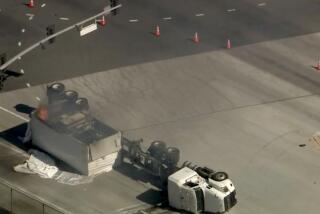Tougher Rules to Keep Water Clean Expected
Orange County is poised to adopt the most sweeping changes in its water runoff regulations since the 1950s, and officials say they will affect everything from the way gas stations hose down their driveways to how pet owners clean up after their dogs.
The new ordinances are required to bring the county into compliance with federal clean-water laws aimed at reducing the amount and type of pollutants dumped in creeks and storm sewers--resulting in pollution that has contributed to a sharp increase in the number of beach closures over the last few years.
The Board of Supervisors is scheduled to vote on the proposed ordinances Tuesday, while Orange County cities will consider similar ordinances throughout the summer.
“It’s so important because anything that gets dumped into the gutter finds its way into our bays and beaches,” Newport Beach Mayor Janice A. Debay said. “You go into the Upper Newport Bay and you can see the oil sitting on the top. It’s very disturbing when you see it.”
The new rules would:
* Toughen regulations regarding discharges into storm drains, including some common household activities. For example, it would classify animal waste as a pollutant to encourage people to begin placing dog droppings in the trash, rather than in the gutter.
* Give public works inspectors greater authority in dealing with illicit dumping, including the power to issue cease-and-desist orders and--in emergency situations--enter private property to correct problems.
* Impose design standards on new developments that would change the way gas stations, restaurants, auto-repair shops and other businesses operate. New gas stations, for example, would require larger canopies to prevent rain water from washing gasoline into storm drains. New restaurants would be prohibited from cleaning equipment outdoors.
* Require businesses that discharge polluted water into storm drains to obtain permits and in some cases pay fees. Some auto detailers, car washes and carpet-cleaners could be covered by the rules, among others.
Environmentalists praised the proposals Friday but said they should only be the beginning.
“Certainly this will be beneficial to water quality for swimmers, surfers, little kids and marine creatures,” said Mark Ryavec of the American Oceans Campaign. “But there is much more we can do in terms of a long-range solution.”
Ryavec said governments could reduce pollution further by requiring that street surfaces be covered with permeable materials like decomposed granite rather than concrete and that cars be periodically inspected for gas and oil leaks.
*
Coastal cities that are most affected by water pollution also expressed support for the changes and hoped they would bring cleaner beaches and estuaries.
“The benefits are reducing pollution and protecting our natural resources,” said Marla Matlove, senior civil engineer for Newport Beach, whose City Council approved the policy Monday. “What it really provides is an enforcement mechanism for when [inspectors] see a violation.”
The federal government requires flood control agencies to develop regulations dealing with water quality management. Orange County’s proposed rules were developed through extensive talks with the various government agencies as well as other interested parties such as environmental groups and businesses.
The proposed Orange County ordinance differs in some ways from the one adopted in Los Angeles County, which has added requirements. Los Angeles County businesses must periodically sweep larger parking lots, and county officials are required to visit businesses and provide information about water pollution prevention.
“We tried to be as open as possible and gain a consensus from the environmental community and the business community,” said Chris Crompton, the county manager of environmental resources. “Of course, I’m not sure this can be all things to all people.”
The Storm Water Management and Urban Runoff plan was four years in the making and marks the first significant changes to the county’s flood control ordinances since 1954, when the biggest water contamination risk came from the many oil fields that dotted the landscape.
“This allows us to deal with the changing nature of the county since the 1950s,” Crompton added. “With them, we are better able to address the kinds of water pollution we face today. . . . It’s certainly a step forward.”
Orange County beaches were closed a record 22 times last year, a big jump from the 15 closures that occurred in 1992. The U.S. Army Corps of Engineers recently concluded that pollution from urban runoff threatened to decimate aquatic and riparian species living in and around Aliso and San Juan creeks, which suffer from severe bacteria contamination.
A key element of the proposed ordinance gives the county’s five flood control inspectors more power to enforce pollution regulations. The ordinance would set up an administrative process that allows inspectors to issue cease-and-desist orders and notices of noncompliance to polluters.
They would also be able to arrest and cite violators and seek their prosecution on a variety of charges ranging from infractions, punishable by $100 to $500 fines, to misdemeanors, punishable by jail terms of up to six months and fines not exceeding $1,000, according to the ordinance.
In emergency situations, inspectors can enter private property to tap a leak or correct other pollution problems, usually with the assistance of a police officer of sheriff’s deputy.
*
Under the current system, inspectors are left with only two options: asking a polluter to correct problems or referring the case to the district attorney’s office for misdemeanor prosecution.
The county’s Public Facilities and Resources Department handles about 400 cases a year but usually refers fewer than a dozen to the district attorney’s office, which tends to prosecute only the most serious infractions, officials said.
The ordinance also takes aim at some common household activities such as disposing of dog droppings. The new rules classify the droppings--and all other animal waste--as pollutants and prohibits people from tossing them into the gutter.
Crompton stressed that the county is not interested in prosecuting unsuspecting pet owners. But officials hope the changes will prompt people to place dog droppings in the trash rather then tossing them into the street.
“We don’t think this is something where someone would face six months in jail,” he said. “It has more to do with public education. Most people are very cooperative when they understand what we are doing.”
The ordinance would also prohibit other activities such as washing paint brushes into county flood control channels. Several cities already prohibit this practice as well as other types of household dumping.
Some businesses that discharge polluted water into storm drains would be required to take out permits from cities, some of which might charge fees.
The proposal would also bring new design standards for the development of new buildings that contribute to urban runoff pollution.
New gas stations and auto-repair shops would be required to mop up ground surfaces rather than hose them down, preventing gas, oil and other substances from flowing into storm drains.
New restaurants would be prohibited from rinsing equipment, cooking supplies and floor mats outdoors. The practice allows food and grease to flow into gutters. Instead, the restaurants would be required to use indoor janitorial sinks.
New buildings would need to have specially designed dumpster areas that prevent trash from mixing with water.
(BEGIN TEXT OF INFOBOX / INFOGRAPHIC)
How Ordinances Would Change
The county is proposing the most sweeping changes in its flood control ordinances since the 1950s. The goal is to reduce polluted urban runoff flowing into the ocean.
SOME PROPOSALS
* Give county inspectors power to issue cease-and-desist orders to polluters.
* Allow inspectors in emergency situations to enter private property to correct pollution problems.
* Classify animal waste as a pollutant that should not be mixed with urban runoff.
* Require some types of businesses that discharge water into storm drains to obtain permits.
CHANGES TO NEW DEVELOPMENTS ONLY
* Require larger canopies over gas stations to prevent rainwater from mixing with spilled gasoline.
* Require gas stations and auto-repair shops to mop grounds rather than hose them.
* Prohibit restaurants from rinsing equipment and mats outdoors.
* Require low-toxicity pesticides and fertilizers in common areas of condominiums and commercial developments.
* Require new designs for trash container areas to prevent runoff from mixing with trash.
Source: Orange County Public Facilities and Resources Department
More to Read
Sign up for Essential California
The most important California stories and recommendations in your inbox every morning.
You may occasionally receive promotional content from the Los Angeles Times.











